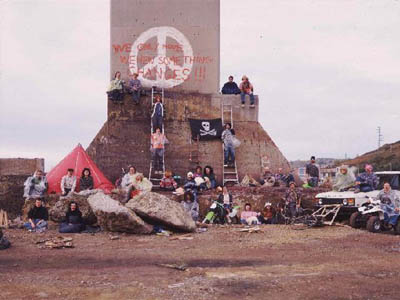 Olaf Breuning "We only move wehen something changes", 2002 Courtesy Gallery ars futura, Zurich Urban Diaries : Young Swiss Art Emmanuelle Antille, John M Armleder, Katia Bassanini, Ursula Biemann, Boycotlettes, Olaf Breuning, Annelise Coste, Christoph Draeger, Yan Duyvendak, Fashionsteel, Sylvie Fleury, Laurent Goei, Fabrice Gygi, Myk Henry, Lori Hersberger, Nic Hess, Thomas Hirschhorn, Hanspeter Hofmann, Zilla Leutenegger, Shahryar Nashat, Elodie Pong, Ugo Rondinone, Costa Vece, Markus Weiss/Markus Wetzel, Andro Wekua For a good decade now there has been a fundamental change in Switzerland’s cultural image. Swiss architects, for instance, have become something of an export item. Architects like Herzog & de Meuron, Peter Zumthor and Diener & Diener work on projects all over the world. Without abandoning their Swiss base, they use their visions in the field of construction and urban planning to give Swiss architecture a high international reputation. A similar phenomenon can be observed in the visual arts. Artists like John Armleder, Helmut Federle, Peter Fischli & David Weiss, Roman Signer and Pipilotti Rist are welcome guests in many important museums in Europe and the USA. The fact that their unique and individual voices are heard in the "concert" of international contemporary art proves well that the art world now takes an interest in more than just the tip of the Swiss artistic iceberg. The exhibition "Urban Diaries: Young Swiss Art" is part of a major, manifold presentation of contemporary art from Switzerland during the Arco 03 period. The conception starts with the factor urban life, which affects the artist's way of working and living and the conceptual framework of art. The exhibition focuses explicitly on the world of contemporary art in Switzerland. Speaking about the art of a particular country naturally involves speaking about place and specific cultural policies and socio-cultural and economic configurations at a specific time. Hence, it should be stated in advance that concepts such as "Swiss art" and "art in Switzerland" are not intended as one-size-fits-all definitions or standard clichés. In the age of globalization and the international exchange of capital and information, the concept of "nation" – a concept associated with the suppression of precisely those cultural distinctions that characterize coexistence in contemporary Europe – may well be obsolete anyway. The same can be said of cultural life in Switzerland, which has long been shaped not only by Swiss-born, but also by immigrant artists. Many of them have exchanged their places of birth for life in Swiss or other international cities, where the development of their work is influenced by the production of international art. Residencies abroad and federal or cantonal scholarships support this opening up to "external" influences. There is also the experience of "internal" multiculturalism through different foreign cultural traditions that have entered Switzerland with new immigrants. The country is exemplary in Europe for the number of its art institutions, its general interest in art and its support for the arts. Hence, it is not surprising that this politico-cultural background has encouraged the development of genuinely serious, internationally recognized artistic positions. This exhibition presents some of these positions as reference points (Thomas Hirschhorn, Sylvie Fleury, Ugo Rondinone, John Armleder), bringing them to the attention of a wider Spanish audience for the first time. But there are others whose singular distinctiveness has crystallized only in recent years (Emmanuelle Antille, Katia Bassanini, Ursula Biemann, Olaf Breuning, Annelise Coste, Christoph Draeger, Yan Duyvendak, Laurent Goei, Fabrice Gygi, Myk Henry, Lori Hersberger, Nic Hess, Hanspeter Hofmann, Zilla Leutenegger, Shahryar Nashat, Elodie Pong, Costa Vece, Markus Weiss/Markus Wetzel, Andro Wekua). Some are being shown abroad for the first time. Curated by Sabine Schaschl-Cooper and Martin Schwander. Ausstellungsdauer: 29.1. – 30.3.2003 Comunidad de Madrid Alcalá 31 E-28014 Madrid |